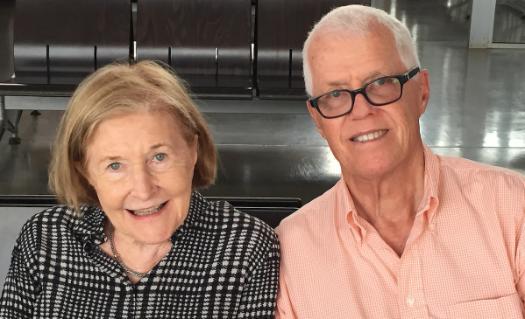Richard and Betty Hedreen’s interest in art started modestly with a desire to find a few pieces to outfit a new home they were decorating. That was 60 years ago. In the time since, they assembled an extraordinary collection of art—spanning the 15th and 16th centuries to modern and contemporary works—that is regarded as among the most prized and finely curated private collections in the U.S.
And this remarkable collection, comprised of more than 200 works—with paintings, pottery, photography, etchings, sculptures and more—is being gifted to Seattle University by Richard “Dick” Hedreen.
This is a truly transformational gift from the philanthropist, whose art collection is valued at more than $300 million, along with $25 million in seed funding to develop the Seattle University Museum of Art. Dick’s late wife Elizabeth “Betty” Ann Petri Hedreen is an alumna of Seattle University and, with her husband, was a longtime supporter of many of the university’s most vital artworks that are part of its existing permanent collection.
The donation is the largest gift of art ever made to a U.S. university and the largest ever single gift of any kind to a university in Washington state.
“Since their earliest days, the Jesuits have recognized the visual arts as a powerful tool of communication and teaching and the arts are an essential part of the holistic Jesuit model of higher education,” says SU President Eduardo Peñalver. “Seattle University is honored to receive this truly transformational gift from the Hedreens, who have built one of the finest private art collections in the nation.”
The collection features works by some of history’s greatest artists including Jacopo da Pontormo, Jan Lievens, Élisabeth Vigée Le Brun, Luis Egidio Meléndez, Thomas Gainsborough, Willem de Kooning, Robert Rauschenberg, Roy Lichtenstein and Robert Indiana. Going deeper, there are etchings by Lucien Freud that represent three decades of his career and photography by artists including Berenice Abbott, Henri Cartier-Bresson, Irving Penn, Louis Stettner and Andy Warhol. Several paintings by Cecily Brown are in the collection alongside work by Rashid Johnson, Vic Muniz, Amy Sherald, Anna Weyant and many others.

Betty and Richard “Dick” Hedreen
Giving their art collection to Seattle University, says Dick, is a way to honor Betty, who passed away in 2022. The couple lovingly built this collection together, with Betty often turning him onto unique pieces that he otherwise wouldn’t know about.
“Betty and I always felt that we were custodians of the artworks we acquired, holding them in trust for a larger purpose. The Jesuits place a special focus on the arts and humanities, including art history, and that has long been reflected in Seattle University’s Jesuit education and its connections to the Seattle arts community,” he says. “My goal is to keep the collection together in the new Seattle University Museum of Art, which will have a profound and lasting impact on students and faculty.”
In the mid-1970s Dick and Betty began to build what would become the collection it is today, acquiring works from across the U.S. and from international markets. What was at the time a burgeoning interest in art collection was spurred on by his friend Charles Cowles, who came to Seattle to be the contemporary art curator for the Seattle Art Museum. Cowles formed a group of individuals with an interest in art and for Dick and Betty it was a chance to become educated about different artists and collections. Recalls Hedreen, “Charlie took us to New York and introduced us to dealers, took us to London and did the same thing. He introduced me to dealers in Switzerland, both in Basel and Zurich, and his idea was that you can buy better art by shopping in the world market rather than buying locally. He turned what was an interest into a passion.”
Go inside the collection with this photo gallery featuring some of the works in the collection.
Central to this gift to Seattle University is a commitment to create a teaching museum that will showcase centuries of art history and be a true learning extension of the classroom. Its location, in one of Seattle’s most vibrant neighborhoods, will provide access to world-class art for our neighbors, including serving as a teaching complement for area schools and other art and cultural organizations.
A lover of art history and the visual arts, Hedreen’s passion for art museums was first implanted in him as a child when his parents would drop him and his brother off at the Seattle Art Museum—Hedreen grew up about a half-mile north—on Saturdays when SAM showed movies. For Hedreen it was a chance to explore and soak up the surroundings outside of the screening room. “I loved walking through the museum, looking at the art and the objects.”
Unsurprisingly, Hedreen remains a connoisseur of museums. Among his favorites: The Metropolitan Museum of Art—“when I am in New York I go visit it four times a week”—and The National Gallery in London.
In talking about the importance of art museums on university campuses he points to the museums at Yale and Harvard (fun fact: In the 1980s Dick and Betty loaned a Picasso to Harvard’s Fogg Museum.) An on-campus art museum “gives the university the tools to teach art history and visitors experience art and how the art speaks to them.”
“I think the same people who go to the Seattle Art Museum will search out Seattle University’s museum,” Hedreen continues. “It will have a better collection than some other museums and be an attractive place for people who already visit art galleries, for art collectors and people generally interested in art.”
Adds President Peñalver, “This new museum will serve as a bridge between our campus and the city, expanding access to the arts for traditionally underserved communities and helping us realize our mission of educating the whole person and empowering leaders for a just and humane world.”
Over the past 25 years, the Hedreens have played a role in the transformation of the SU campus, ensuring that art became part of the infrastructure. They were among the lead donors for the university’s award-winning Chapel of St. Ignatius—itself highly regarded as an architectural work of art—and co-chaired the funding campaign to build the university’s Lee Center for the Arts, which houses the Hedreen Gallery to showcase emerging artists. Over the years, they have gifted pieces of art that grace nearly every building and green spaces on campus, including outdoor sculptures by Joel Shapiro and James Rosati, and paintings by David Bates, Alfred Jensen, Bill Jacklin, Jo Baer, Elizabeth Murray, Larry Poons, Francesco Clemente and Al Souza.
“My impression has always been that the Jesuits are great educators and that as such they provide a finer education because of their interest in literature, poetry, music and art. So that was attractive to me,” says Hedreen. “Betty went to Seattle University and I wouldn’t have met her had she not attended school there. I always felt like I wanted to support Seattle University.”
About Seattle University’s Permanent Art Collection
Inspired by the 1997 opening of Steven Holl’s internationally acclaimed Chapel of St. Ignatius, which put Seattle University on the map as a significant destination for art and architecture in the Pacific Northwest, every new or renovated building at Seattle University has become a venue for important works of modern, contemporary and Indigenous art created by local and international artists. Many of the works are contemporary, representing diverse styles and media, ranging from sizable pieces in major spaces to small works encountered in remote study areas. Artists represented include Dale Chihuly, Joel Shapiro, James Rosati, Alfredo Arreguín, Gaylen Hansen, Jacob Lawrence, Alfredo Jaar, Julian Opie, George Tsutakawa, Paul Horiuchi, Henri Matisse, Roy Lichtenstein, Preston Singletary, Calvin Hunt and Tom Hunt, Susan Point and many others.
